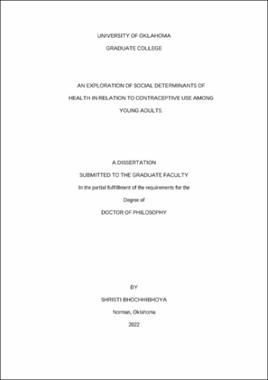| dc.description.abstract | Background: Low and inconsistent contraceptive use in young adults leads to increased unintended pregnancies. Prior research primarily focused on individual-level influences such as contraceptive attitudes and beliefs, with little consideration of social domains and contextual factors (e.g., economic and neighborhood characteristics). This dissertation project explored cross-sectional and longitudinal associations between social domains and young adult contraceptive use utilizing the Healthy People 2030 Social Determinants of Health (SDH) framework. Additionally, this dissertation also explored the mediating influence of contraceptive self-efficacy between SDH domains and contraceptive use. Methods: Proxy measures related to five SDH domains (economic stability, education, social and community context, health and health care, and neighborhood and built environment) were extracted from the National Longitudinal Study of Adolescent and Adult Health (Add Health) Wave I, II and III data to explore the association with past year ever-use and consistent use of contraception among young adults (18-26 years). Two multi-level binary logistic regressions were employed using Mplus v.8.7 to explore cross-sectional and longitudinal associations. Path analysis utilizing bias corrected bootstrapping was used for exploring mediating influence of contraceptive self-efficacy. Results: Of the 11,575 participants (Mean age: 22.02 years, (SD: 1.78); 53.77% female), 75.14% reported past year ever-use of contraception, while 45.33% were consistent contraceptive users. Cross-sectional results indicated that, out of 11 measures, six and ten measures had an empirical relationship with the past year ever-use of contraception and consistency of contraceptive use, respectively. Out of 14 key issues, in longitudinal study, six and eight key issues measured at adolescence had significant associations with past year ever-use of contraception and consistency of contraceptive use at young adulthood, respectively. Furthermore, contraceptive self-efficacy had a mediating influence between 4 key issues and past year ever-use of contraceptive use, while contraceptive self-efficacy mediated between 5 key issues and contraceptive use. The key issues were associated with Education, Social and Community Context, and Health and Health care. Conclusions: A favorable environment during adolescence and young adulthood provide a foundation for positive health behaviors. Interventions aimed to increase contraceptive use among young adults should focus on creating supporting environments during adolescence. Contraceptive self-efficacy can be targeted in short behavioral interventions to improve contraceptive use. | en_US |

